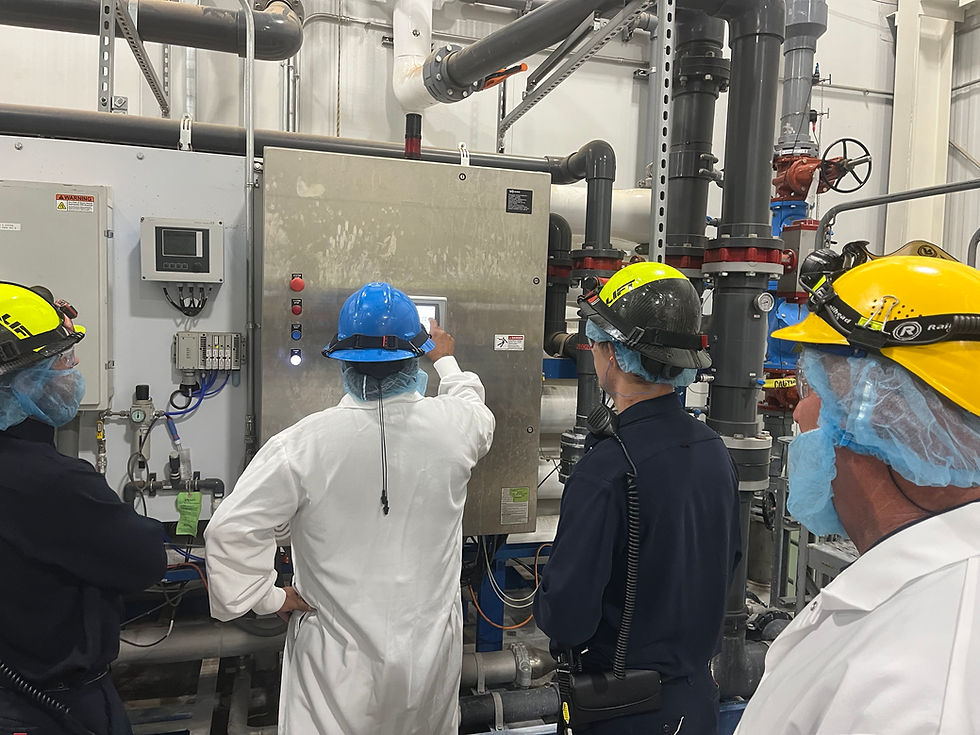Water System Consulting in Food Production Facilities
- Heather

- Aug 27, 2025
- 3 min read
In food production, water quality is essential. As a Facilities Manager or Quality Control Manager, you understand that water quality can make or break your products. This is where water system consulting becomes critical.
This post highlights a recent water system consultation project we conducted. A large food production facility in Texas aimed to extend the lifespan of its 108 membrane RO system, so Commercial Water was engaged to provide recommendations and methods for proper maintenance of their RO system.
Understanding the Importance of Water Quality
Water is often referred to as the "universal solvent" for good reason. In food production, it plays a crucial role in everything from ingredient preparation to cleaning.
From our experience with food production facilities, maintaining high-quality water is vital for building a strong brand reputation. A facility that consistently produces high-quality products may experience increased customer loyalty, with studies revealing that loyal customers are willing to spend up to 67% more on trusted brands.
Wading through variables--and some ground work
The client's 108-membrane RO system is underperforming relative to the manufacturer's specifications, and it has not been providing reliable water flow for production.
Prior to the official site visit, there was some investigative work: we contacted the city water department for a water report, which indicated high levels of silica. We examined the source of municipal feedwater, discovering that the water is sourced 70% from surface water and 30% from groundwater for half of the year, then switches to 30% surface and 70% groundwater. There are significant fluctuations in feedwater quality and composition.
Another potential issue lies in the facility's plumbing and distribution system layout: a 25-foot rise and substantial horizontal run to the process water storage tank poses concerns about backpressure within the RO system.
We submitted the municipal water analysis to the RO system manufacturer. Their representative provided system specifications for ideal conditions. However, ideal conditions rarely exist and we face many unknowns: for instance, the food production facility could not provide a date for when the 108 membranes were installed. Additionally, there is no formalized timeline or checklist for scheduled RO system maintenance.
In our Water System Report, we offered several notable recommendations that may assist the reader:
Operate the RO Unit at a lower recovery rate, i.e., reject more water. In this case, the recommended recovery range was 50-60%.
Follow the manufacturer's specifications for the clean-in-place (CIP) system. Note any signs indicating the RO system needs cleaning, such as a 10-15% reduction in permeate production.
Calibrate all flow meters to ensure accuracy.
Verify the suitability of current anti-scaling chemical products in light of local water supply contaminants.
Based on feedback from the RO manufacturer, combined with local water quality and user behavior, we provided a realistic membrane life expectancy of 12-18 months.

The Crucial Element: Routine Water System Maintenance
The final recommendation is to establish a clear baseline: In order to protect your facility's investment in RO membranes, there must be an accurate reporting of current membrane age/installation date. This is important for isolating variables when a problem arises.
Further, design and follow a consistent schedule of membrane cleanings. Publish and have technicians sign off on a bona fide cleaning procedure.
If total membrane replacement becomes necessary, all associated personnel should be trained in clearly established maintenance schedule and procedures.
Choosing the Right Water System
Investing in a strong water purification system enhances product quality and bestows significant cost savings. When selecting a water purification system, keep these important factors in mind:
Water Source: The type of water source, whether well or municipal, will shape your purification system's design. Each source presents different challenges and requirements.
Production Needs: Assess your facility's specific water needs based on production volume and processes. Understanding these will help determine the capacity and type of system required.
Budget: While investing in quality is vital, staying within budget is equally important. Look for systems that provide the best long-term value. And then take care of your investment with a keen eye to documented regularity with maintenance and upkeep.
Vendor Reputation: Selecting an equipment vendor with a strong track record in the food production industry can make a significant difference in the effectiveness of your water system.

Final Thoughts
Water system consulting is crucial for ensuring the safety and quality of food production. By leaning into the expertise of a third party professional water consultant, you can keep your system working according to expectations and achieve significant cost savings.
With the right consulting and systems in place, the right water can ensure exceptional food quality. Let’s commit to making it pure.
For more examples of Commercial Water purification projects, please continue here.



Comments